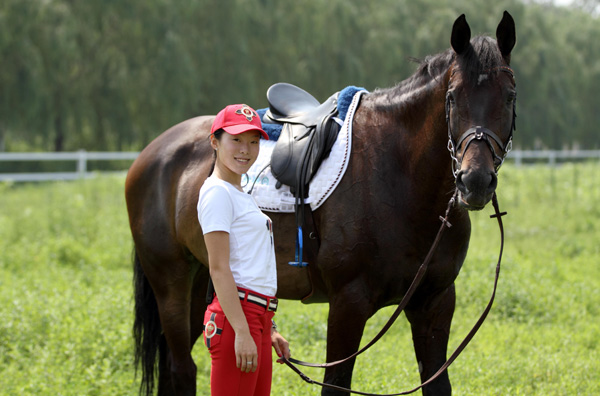|
 |
|
Young rider learns life lessons from horses? |
Originally, Tian Yu's parents wanted her to become a ballerina and she started ballet lessons at the age of three, but a family trip to a horse ranch changed her life path and led to her becoming a professional rider.
"It was simple — I just liked the feeling of riding on the horseback." Tian, 19, said of her first riding experience in Beijing's Fragrant Hills Park when she was 4 years old. "Kids usually fear big animals, but I was not afraid of the big horse at all."
Once she was old enough to sit on a horse by herself, Tian, who lives in Beijing, added equestrian lessons to her ballet schedule.
"They have many things in common — the training for ballet stretched my limbs and exercised my balance," Tian said. "But as both training routines went further, it was hard to keep them both."
In 2003, Tian gave up ballet and devoted her time to horse riding, and the following year she won her first trophy in a show jumping competition.
When Tian turned 18, she became the youngest female professional rider in China, and her total points last year put her in 8th place in national show jumping. Zhu Meimei, the top Chinese equestrienne, ranked 6th.
In the past decade, Tian has participated in numerous competitions and won dozens of prizes. Of them all, placing 6th in the China Tour in October 2013 means the most to her.
"Only six riders scored a ‘clear round', and Bianba Ciren and I were the only two Chinese riders," Tian said proudly. "It was the most difficult competition and the result was the most satisfactory one to me. I was surprisingly happy because it was not until last June that my horse and I started to jump heights of 140 to 150 centimeters."
Tian received her prize alongside Brazilian rider Rodrigo Pessoa and British rider Ben Maher, both Olympic gold medal winning show jumpers. "It is a dream for many young riders to compete with them," she said.
Tian got her own horse at the age of 13 — a Dutch Warmblood mare called Widuna.
"Owning a horse means more responsibility — a lot of trivia and errands. It's like a relationship — not always as romantic as one imagines," she said.
She loves horses and views them as her closest friends.
"I take care of them in the stable; they take care of me on the course," she said.
Having finished her studies at Beijing National Day School this summer, she is now preparing for upcoming competitions at the Beijing Pengyuan Equestrian Club.
Every morning, Tian goes to the stable to feed her two horses, muck out the stables and change the straw. Once a week, she gives the horses a massage.
"Although it is common abroad, few Chinese young riders take care of their horses on their own like Tian does," said groom Gu Guoliang, who learned his trade in Germany. "I got to know Tian five years ago when she was washing her horse alone, and I found her mature and independent."
After riding the horses, Tian washes them and brushes them down. "If I were a horse, I would definitely like to have a shower after all the galloping and jumping," she said.
"Some people mock Tian online, saying she succeeds only because equestrianism is a sport for the rich," said Tian's mother, who gets upset at negative comments about her daughter on the Internet, "but how many rich people would like to do such dirty work themselves?
"If she had given up horse riding, she would live much more comfortably, but she chose to stick to it and that's why I decided to support her all these years."
During this year's Longines FEI World Cup Jumping China League in May, Tian's main horse Wonder Boy injured its knee. Although the injury was not serious, Tian chose not to risk her "boy", which meant she lost her points in the FEI world ranking.
When Tian submitted her paperwork to retire from the event, the chief judge hugged her, she said.
"He said he was glad to see me put the horse in first place, and that he respected me," Tian said, adding she has never regretted her choice.
"If equestrianism has taught me anything, it is to respect every life."
Tian plans to go overseas to study veterinary science in the future. "There are few riders in China," she said, "but there are even fewer vets."
